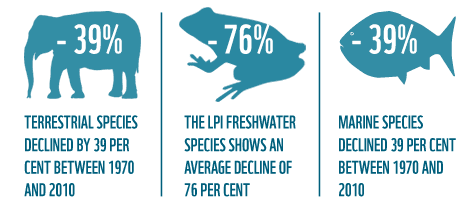The WWF has reported the Earth lost half its wildlife in the last 40 years. This is an alarming rate that exceeds the great extinction of the dinosaurs, experts said.
The “Living Planet Report“ is compiled by the WWF every two years to assess the biodiversity of the planet. By compiling a measurement of more than 10,000 representative populations of mammals, birds, reptiles, amphibians, and fish, into a record called the Living Planet Index, researchers have determined that the total has dropped by 52 percent since 1970.
The report, broken down, shows a percentage loss of 39 percent in terrestrial animals, 76 percent loss in freshwater animals, and 39 percent in marine animals between 1970 and 2010.
But how important are these findings?
A group of experts on wildlife conservation gave a chilling account of what this really means.





